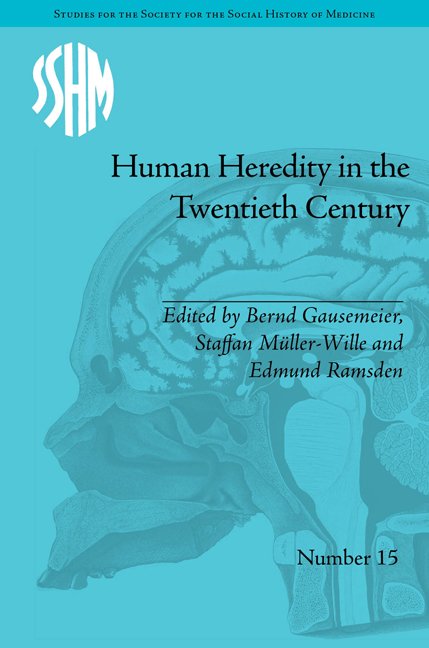Book contents
- Frontmatter
- Contents
- Acknowledgements
- List of Contributors
- List of Figures and Tables
- Introduction: Human Heredity in the Twentieth Century
- Part I Constructing Surveys of Heredity
- Part II Blood and Populations
- Part III Human Heredity in the Laboratory
- Part IV Understanding and Managing Disease
- Part V Reconstructing Discipline(s)
- 14 The Emergence of Genetic Counselling in the Federal Republic of Germany: Continuity and Change in the Narratives of Human Geneticists, c. 1968–80
- 15 Performing Anger: H. J. Muller, James V. Neel and Radiation Risk
- 16 The Struggle for Authority over Italian Genetics: The Ninth International Congress of Genetics in Bellagio, 1948–53
- Notes
- Index
14 - The Emergence of Genetic Counselling in the Federal Republic of Germany: Continuity and Change in the Narratives of Human Geneticists, c. 1968–80
from Part V - Reconstructing Discipline(s)
- Frontmatter
- Contents
- Acknowledgements
- List of Contributors
- List of Figures and Tables
- Introduction: Human Heredity in the Twentieth Century
- Part I Constructing Surveys of Heredity
- Part II Blood and Populations
- Part III Human Heredity in the Laboratory
- Part IV Understanding and Managing Disease
- Part V Reconstructing Discipline(s)
- 14 The Emergence of Genetic Counselling in the Federal Republic of Germany: Continuity and Change in the Narratives of Human Geneticists, c. 1968–80
- 15 Performing Anger: H. J. Muller, James V. Neel and Radiation Risk
- 16 The Struggle for Authority over Italian Genetics: The Ninth International Congress of Genetics in Bellagio, 1948–53
- Notes
- Index
Summary
Whereas modern genetic counselling was already established in the UK and the USA by the 1940s, it was not until the beginning of the 1970s that it became institutionalized in the Federal Republic of Germany (FRG). During the first decades after World War II, it was provided sporadically to single persons, families, couples and parents of unborn children, who asked for advice from human geneticists established at the universities. In the 1970s regular genetic counselling services were introduced, driven, in part, by the increased interest of public health authorities. By then genetic counselling had become an acknowledged medical service, receiving government support and public acceptance. This essay traces the emergence of a climate favourable to genetic counselling. In particular, it analyses how eugenic motives shaped the discourse of human geneticists involved in the institutionalization of genetic counselling.
Over the past decades, an increasing amount of historical research has identified the longevity of eugenic discourses and practices – from the turn of the last century, when eugenics emerged as a biopolitical concept defined by the aim of improving the ‘hereditary health’ of the ‘national body’ (Volkskörper), to well beyond 1945. Although eugenicists propagated voluntary ‘genetic marriage counselling’ long before the political upheaval of 1933, eugenics is usually regarded as a political programme demanding authoritarian implementation, a nexus epitomized by Nazi racial hygiene.
- Type
- Chapter
- Information
- Human Heredity in the Twentieth Century , pp. 193 - 204Publisher: Pickering & ChattoFirst published in: 2014

